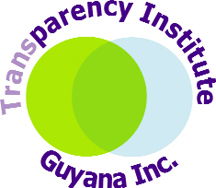The Transparency Institute of Guyana Inc (TIGI) held its first annual fundraising dinner on 23 November, 2012. The event was well attended, especially by members of the business community. Mr Deryck Murray, Chairman of Transparency International Trinidad and Tobago Chapter, a former West Indies wicketkeeper for more than a decade, gave the feature presentation.
Today, we present a condensed version of Mr Murray’s presentation to the attendees of the function.

The Trinidad and Tobago experience started when former Ambassador and Head of the Public Service, Mr Reginald Dumas, read about Transparency International and wrote the body because of the situation in Trinidad at the time. The international watchdog body visited Trinidad and met with some prominent businessmen as well as Mr Dumas. A few years later, in 1998, the Trinidad Institute was born with the initial objective of being a fount of knowledge, research and discussion and of sharing its knowledge with the wider public.
Throughout the years, we have attempted to pursue that vision through partnerships with the public and private sectors, the university and the media. However, a lack of resources means that we are not yet where we want to be. We address issues of perceived corruption in the public services directly with government but we also issue press releases and/or hold media interviews.
The relationship with government varies considerably over time. Currently, it can be described as an accommodating working relationship. Occasionally, it can be aloof, and government officials are not easily accessible. At times, the relationship has been hostile but generally, government is a little bit wary.
Transparency Institute’s philosophy is to address issues in a non-partisan and non-political way, particularly the issue of governance. We, however, do not personalize issues. In general, you will be addressing issues such as government awarding contracts or placing unqualified persons in key positions. Invariably, you will be perceived as anti-government. We would like to be proactive by being able to meet with government at short notice and/or address directly with them “emerging” issues before they become “a national scandal”.
There is a need to build credibility because it will also influence and enhance your prospects of obtaining funding. Our official membership in Trinidad is about 150 in addition to 35 corporate members, and we tap available funding from international organisations as well as private funding from donors. We must nevertheless develop our own income-generating activities, such as this Dinner, and for Trinidad and Tobago, anti-corruption training.
There was a time in West Indian cricket when we were laughed at in view of our standing in the international arena. However, because of the astute leadership of Clive Lloyd (who was present at the function), and through determination and hard work, we became number one in the game. We can do the same as it relates to corruption and join countries like New Zealand and Denmark in our ranking and standing on the Corruption Perceptions Index. Our mission should be to work towards a country and region that are free of corruption.
Recently, I had the good fortune of attending the International Anti-Corruption Conference in Brasilia. The resulting declaration covered two main areas. The first is: the People’s Charter which states that citizens acting in coordination can effectively challenge governments, corporations, financial institutions, sports bodies that neglect their duty towards them. This is empowerment of civil society. The second is: No Impunity. The charter states that impunity undermines integrity everywhere. The more vulnerable in society are the ones who suffer most from corruption. Basic needs are denied; and resources are diverted to private pockets rather than going into basic amenities, sports facilities, water, healthcare, schools etc. “Don’t let them get away with it”.
Ladies and Gentlemen, we must fight against corruption! Why? Because corruption results in waste through inappropriate allocation of a country’s resources (estimated as losses of trillions of dollars in developing countries). It supports and encourages a culture of crime and it undermines the institutions so essential for our personal safety and quality of life – the public service, the protective services, and the judiciary.
Left unchecked, corruption can undermine our democratic human rights, civil liberties, sustainable development, indeed the soul of the nation.
We must unite and replace corruption with integrity. I implore the private sector to join the battle. “Corporate social responsibility” must not be just jargon, not just words to make a company look good but must reflect in significant financial contributions to the civil society organisations which can help us to a better tomorrow.




